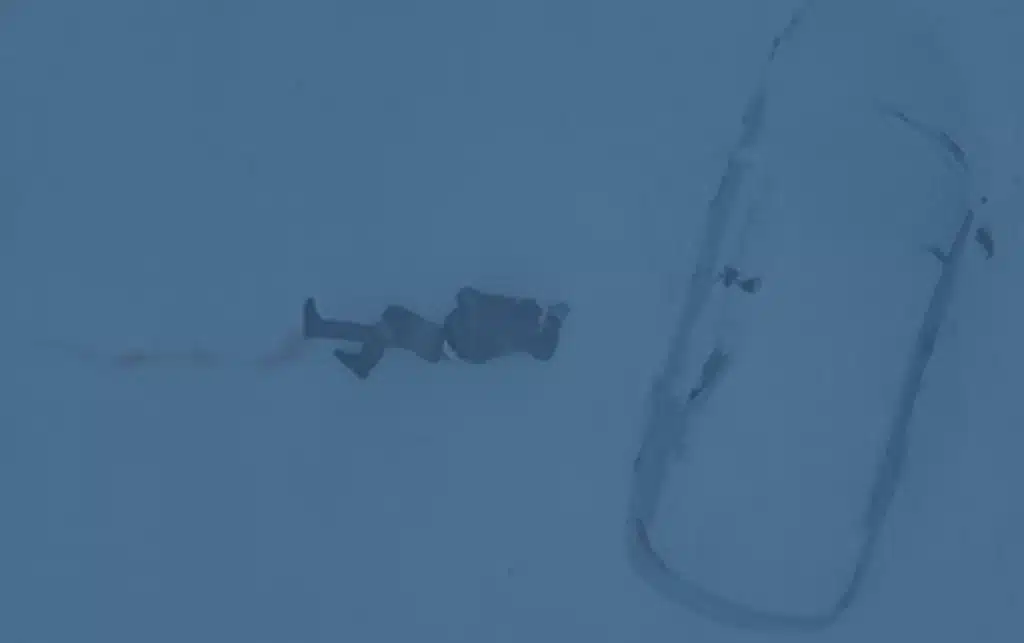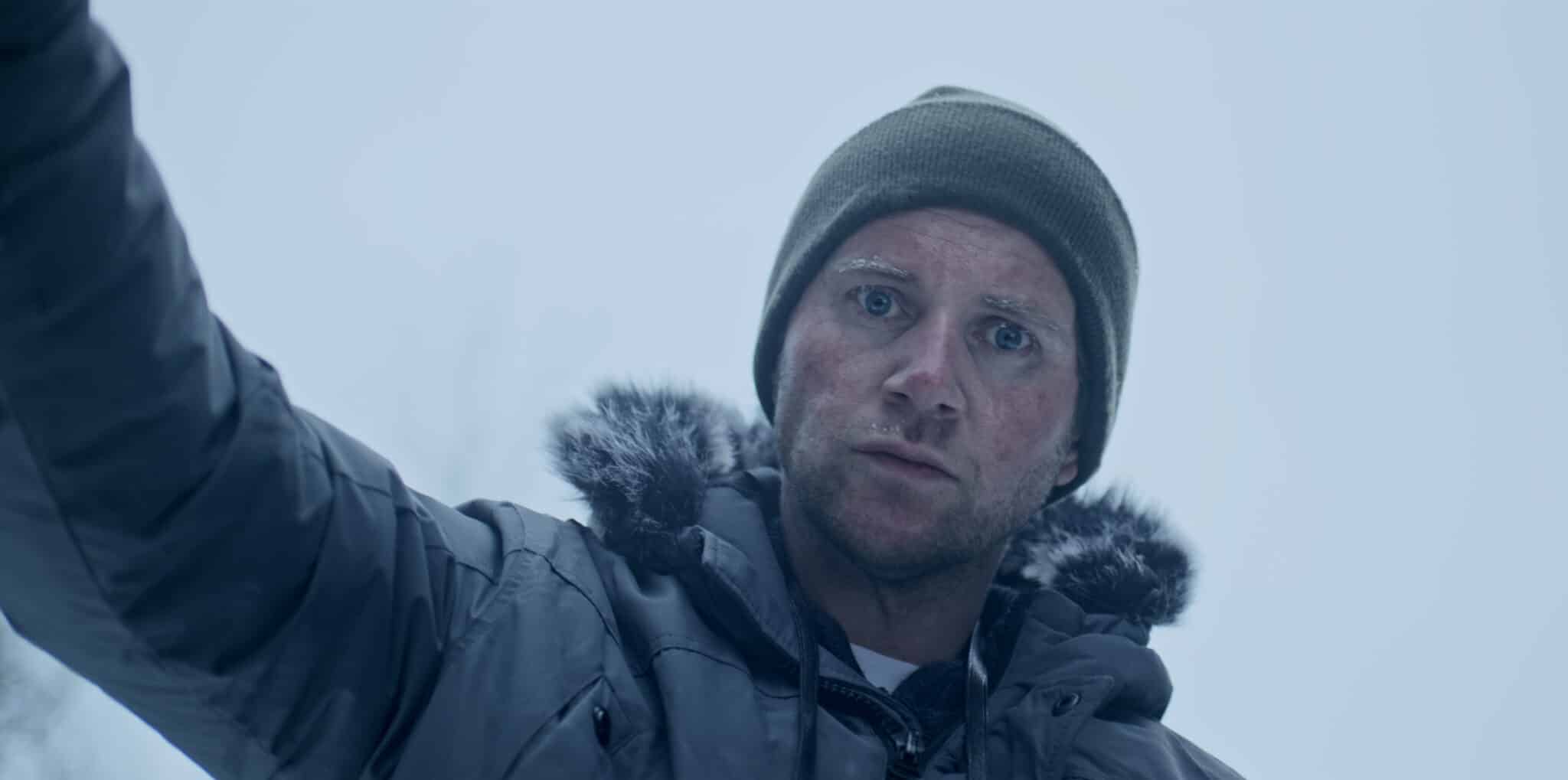
It’s the run-up to Christmas and, somewhere in a remote corner of Colorado, a lone traveller is off on a road trip, despite the treacherous conditions. He stops his car at a roadside café, but it seems that something is unfolding there: as the last customers depart for the day, leaving only our traveller – David – the waitress, Ana (Nina Bergman) has apparently been fielding a series of unhinged texts and calls from her estranged husband. She puts on a brave face, but – irrespective of the fact that David is sat there – the husband turns up, threatening, demanding, threatening, demanding.
This puts our guy David (Allen Leech) in a quandary: help her? Or recede into the background? He decides on the former, getting into a nasty conflict with Vincent (Yan Tual) as a result, but he successfully talks Vincent down in a well-acted and scripted sequence of events which feels like a genuinely tense situation. Things only lull momentarily however: after receiving Ana’s gratitude for his pains, David is back on the road again, but Vincent is soon on his tail, having presumably already jettisoned the sound moral lesson meted out back at the café.
So it seems as though a game of cat-and-mouse is to ensue through this remote and hazardous stretch of the Rockies – in the dark, with a snow storm incoming. This would, by the by, serve for a great horror film on its own terms, in the right hands – a kind of Tailgate (2019) On Ice – but quickly, startlingly, Cold Meat begins to cycle through a range of different possible horror genres. We’re clearly faced with the horrors of the dark and the cold; there’s potentially a dangerous and sexually-jealous male out there; in fact, what could the film’s title actually mean? It’s a fairly workaday horror title, but still ambiguous: actually, I’d be all for scrapping the female voiceover during the opening credits, leaving things entirely to the audience to fathom, even though that would deprive the film of a neat moment of circularity later on in its runtime. But back to where we were: panicked, pursued and feeling the heat (ironically), David veers off the road, running his car into a sizeable snowdrift.
Is it bizarre that our Mr Rational is travelling by night, in the Rockies, without a snow shovel? Yes – the film does have a couple of moments where basic incredulity comes close to impeding on the film as a whole – but regardless, he can’t free his car, there’s a blizzard raging, and he decides to just hunker down for the night. So this is a survival horror now? David passes an uncomfortable night and, as planned, tries to look for help the following morning, where it’s clear just how much snow has fallen. Just as it could be a road movie, it could be an introspective nightmare of survival, but – as we soon find out – there’s more, far more than the cold to contend with here. In a dark twist, the film begins the real about-face work, disrupting, changing tack and introducing a range of ideas and threats to its audience.
It’s hopefully not to spoiler the film to point out that a lot of it takes place inside a vehicle, and as such, it needs good characters and a great script to stave off indifference. We very definitely get that here. David immediately comes across as an eminently decent, plausible man. He’s not quite an Everyman character – because most of us aren’t brave enough to tackle a potentially violent, spitting stranger – but he comes across well, which is important in a whole range of ways in how the film plays out. Kudos to Allen Leech for that, and to Yan Tual too, who does a great job of being David’s unreasonable Other: Vincent is splenetic, vindictive – and a bullying brat of a man, a danger to himself and others. Are these impressions accurate? The question seems answered, but then something else occurs. There are other characters too; they are equally valuable, and equally well-written, and the film uses the relationships between them, as well as other, external factors to perform abrupt bait-and-switch moments but also, gradual, casual, devastating reveals. Appearances are always deceptive in Cold Meat. We also get dreams and flashbacks which add texture and interest, but always more questions.
Just as interiors are of vital importance here, so are the exteriors, and the film makes great use of the landscape; it’s quick off off the mark with those intimidating, dangerous, unlit routes (there’s something so evocative about a car’s headlights picking up the next-to-nothing of a dark, mysterious road). It feels entirely plausible that someone could be buried in the snow out here and never found. It is certainly a cold-feeling film, too: the audio, as well as the visuals, make sure of that. The jeopardy is realistic. The early-stage frostbite looks convincing. All of this, and then more going on out there: a couple of very minor lulls are more than forgivable, given the devastating developments to follow.
As things progress, you see more and more that the film contains a sickly layer of misogyny, one which hits all the harder because it all stems from very commonly- and casually-held attitudes about women. These are often taken to their grimmest conclusions in horror of course, but they stem from something recognisable, and Cold Meat signals early that it knows this. The battle of wills aspect in the film hits all the harder for this early signalling, and the film is even confident enough to have its characters self-reflect on this, and other horror truisms along the way. Whilst it feels like accidental good timing that Cold Meat is releasing hot on the heels of True Detective: Night Country with its own long, dark roads and monstrous aspects, it is its own beast for sure. Filmed in just twelve days, and the first feature by director Sébastien Drouin, this is a tense and successful story which will surprise you. Recommended, and worth seeing without risking the news coverage by some of the larger horror outlets, quite honestly. It deserves to grant audiences those discomfiting surprises.
Cold Meat (2023) will be released in the UK on 26th February.
